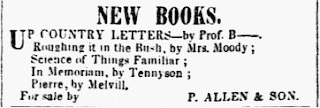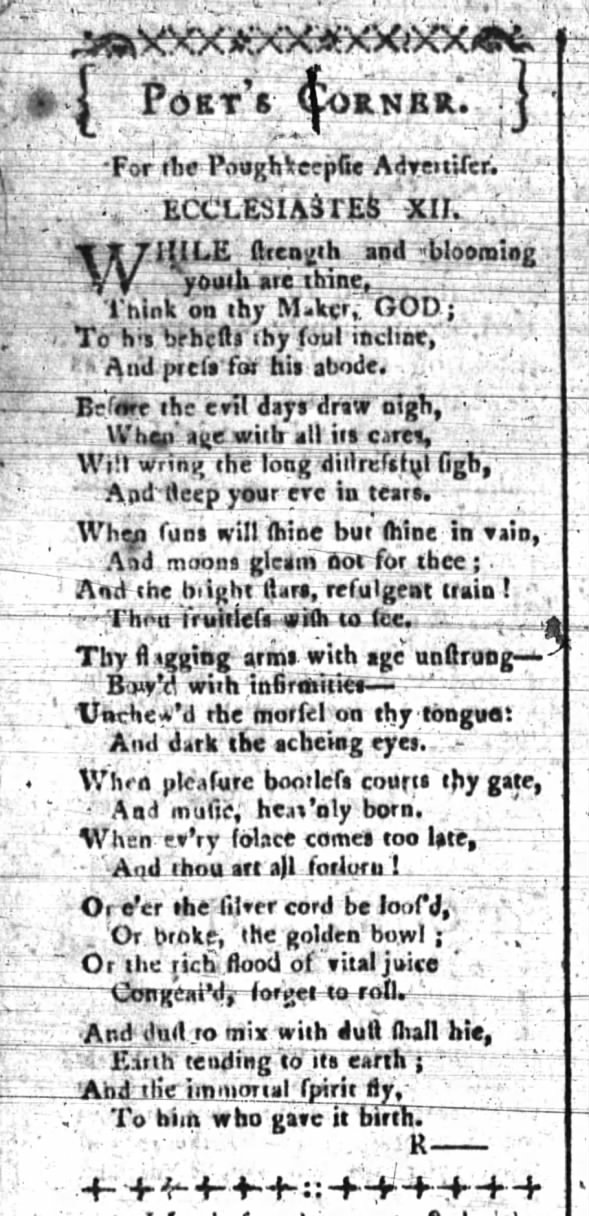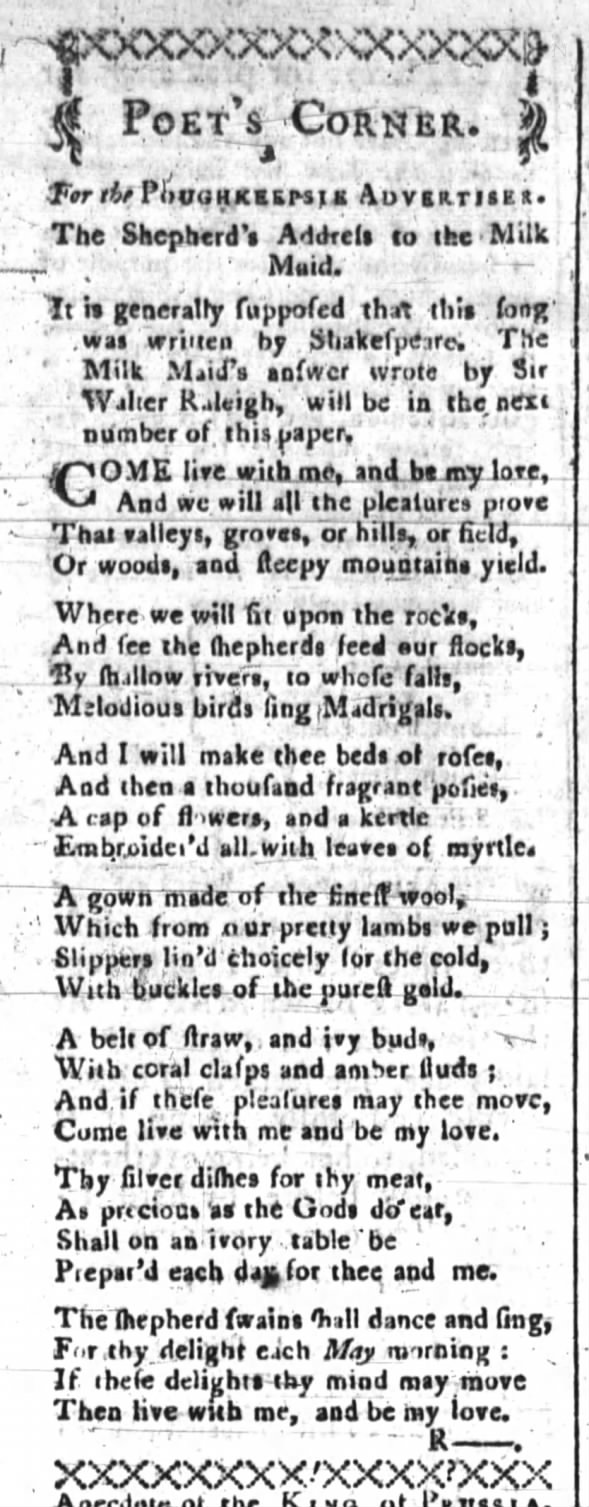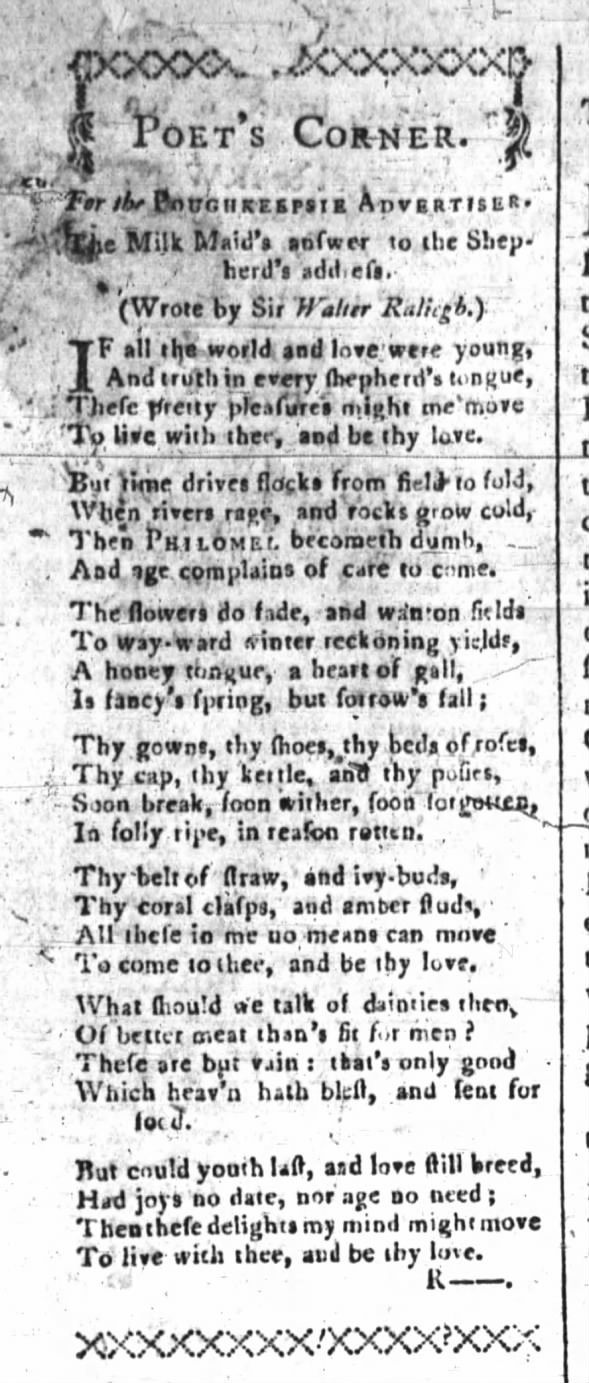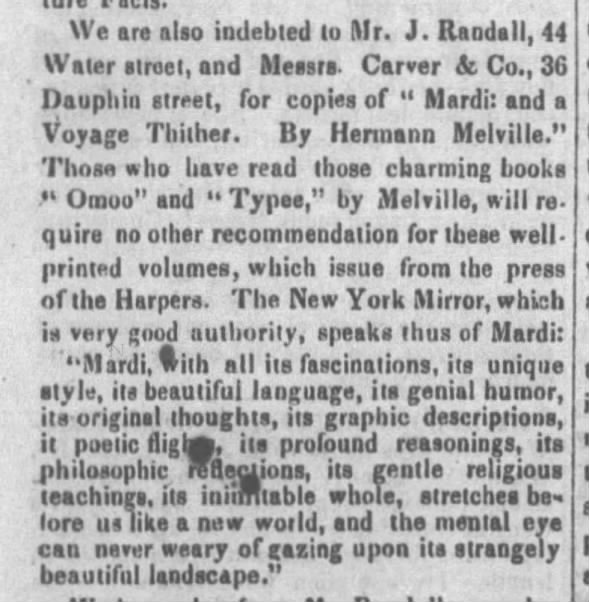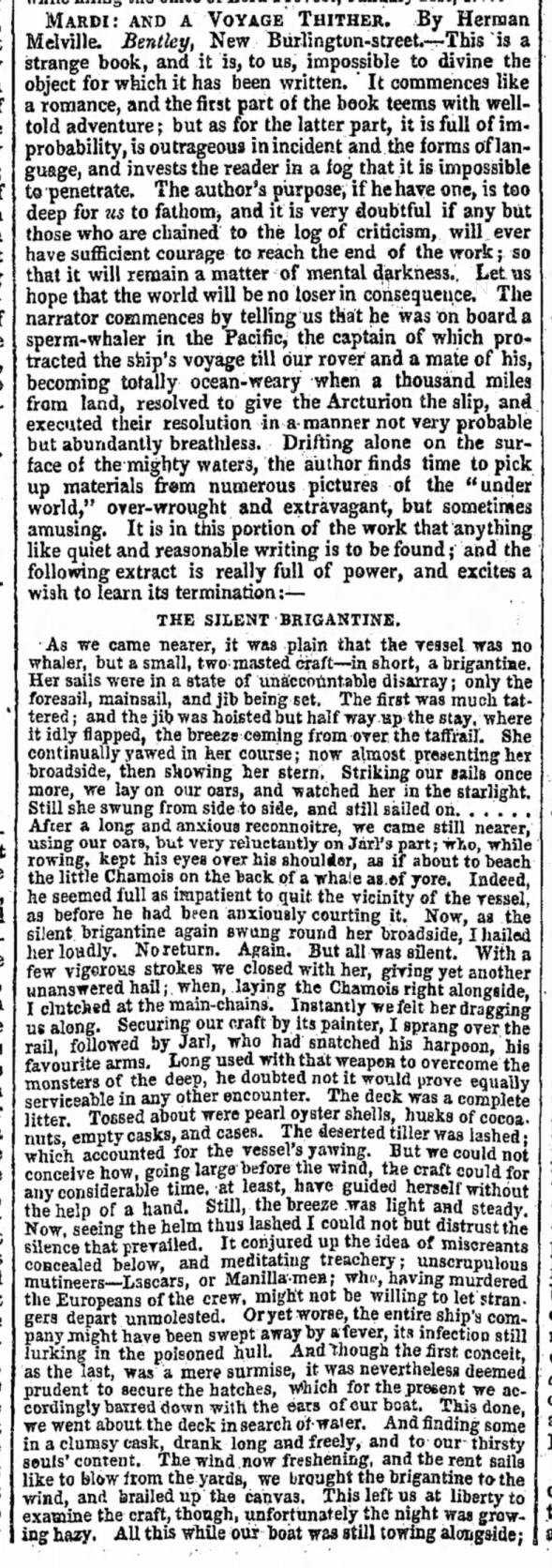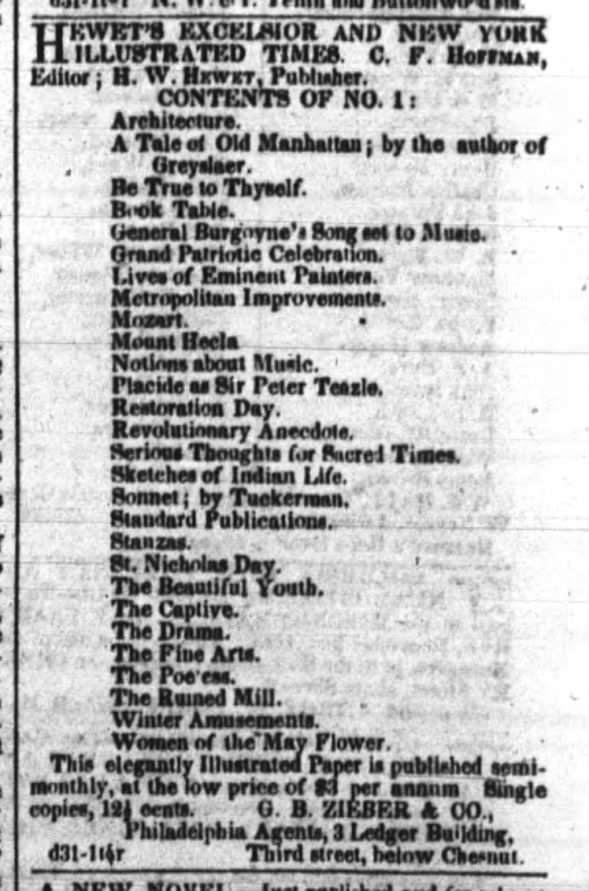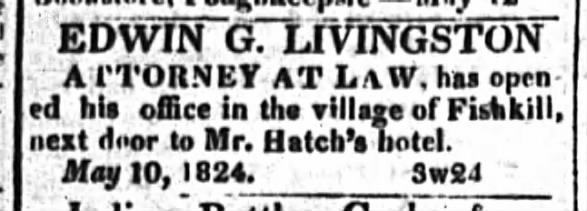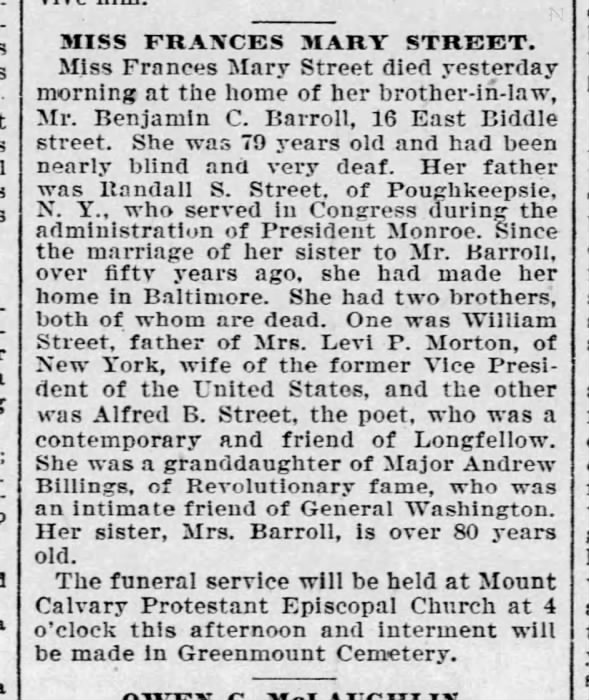In March 1930 Columbia University Press published
Charles Fenno Hoffman, a doctoral dissertation on the quintessential Knickerbocker by Homer F. Barnes. Hershel Parker credits Barnes for information on Hoffman's physical appearance and mock correspondence of Zachary Taylor in the first volume of
Herman Melville: A Biography (Johns Hopkins University Press, 1996;
2005 in paperback). The bogus Old Zack letters by Hoffman are extant and accessible online via The New York Public Library Digital Collections:
Manuscripts and Archives Division,
The New York Public Library. "Hoffman, Charles Fenno (1806-1884)"
The New York Public Library Digital Collections.
1850 - 1868.
http://digitalcollections.nypl.org/items/e1facd90-693c-0133-c93c-00505686d14e
Barnes's valuable study is currently available online via the
Internet Archive. Herman Melville shows up on pages 104 and 185. At 104 Barnes quotes from the "deeply impressed" Hoffman's "complimentary" review of
Typee in the New York
Gazette & Times (March 30, 1846). A few pages later Barnes gives Hoffman's letter to Evert A. Duyckinck, recommending publication in
The Literary World of fresh western sketches by Francis Parkman.
Office Evening Gazette — Thursday
My dear Sir,
Allow me the pleasure of making you acquainted with my friend
Mr Francis Parkman of Boston. Mr Parkman has lately returned
from the Rocky Mountains whither he went to make some scientific enquiries relative to Indian languages usages etc, with reference
to an elaborate work upon these subjects which he contemplates
finishing at some distant day.
Meanwhile he has thrown off some easy sketches of his tour to
make up a light volume for summer reading. The prevailing interest among all classes about the emigration and routes of emigrants to Oregon must necessarily command a hearing for him
with the public. I have therefore my Dear Sir, had no hesitation in commending him to the Editor of "The Literary World" to
introduce "The Oregon Trail — or A Summer out of Bounds’’ — to
both Publisher & readers. You will find Parkman a clever fellow &
a gentleman as well as a traveller & student worth knowing.
Truly yours
C F Hoffman
E A Duyckink, Esq
N B I have just glanced at “the work” —Thank you for Copy
— Nothing could look better
Duyckinck must have passed since
The Literary World did not publish Parkman's well-recommended travel narrative--doubtless to his later regret, as Barnes observes:
The Literary World did not accept Parkman's "sketches" for publication. They soon appeared, however, in The Knickerbocker, and their popularity must have caused The Literary World to realize that it had missed an unusual opportunity. --Homer F. Barnes on Charles Fenno Hoffman (New York: Columbia University Press, 1930) page 109.
Digital images of Hoffman's
letter to Evert A. Duyckinck in manuscript are accessible online courtesy of the Manuscripts and Archives Division,
The New York Public Library. "Hoffman, Charles Fenno (1806-1884)"
The New York Public Library Digital Collections,
1850 - 1868:
- http://digitalcollections.nypl.org/items/e1facd90-693c-0133-c93c-00505686d14e
Francis Parkman's sketches of his summer travel "out of bounds" were serialized in
The Knickerbocker starting in
February 1847.

Parkman's magazine sketches appeared in book form as
The California and Oregon Trail, afterwards shortened to
The Oregon Trail. Melville reviewed the book version for Duyckinck in
The Literary World of March 31, 1849. The text of Melville's unsigned review of Parkman's
Oregon Trail has been available online since 2012 in the Melvilliana post
Mr. Parkman's Tour
Digital images of Melville's
Review of The California and Oregon Trail in manuscript are now also available online courtesy of the Archives Division,
The New York Public Library. "Review of The California and Oregon trail,"
The New York Public Library Digital Collections,
1849:
- http://digitalcollections.nypl.org/items/76003a20-1830-0133-c9a3-58d385a7b928
The Melville mention on page 185 of Barnes's 1930 book occurs in the context of Hoffman's struggle with mental illness. Barnes gives only part of the now well-known passage about "Poor Hoffman" from Melville's April 1849 letter to Evert Duyckinck. Adopting the abridged text as presented by Meade Minnigerode in
Some Personal Letters of Herman Melville, Barnes omits Melville's more personally revealing remarks:
— I remember the shock I had when I first saw the mention of his madness. — But he was just the man to go mad—imaginative, voluptuously inclined, poor, unemployed, in the race of life distancd by his inferiors, unmarried,—without a port or haven in the universe to make. His present misfortune—rather blessing—is but the sequel to a long experience of morbid habits of thought. --Herman Melville, Correspondence, ed. Lynn Horth (Northwestern University Press and The Newberry Library, 1993) page 128.
I'm highlighting the word "morbid" as transcribed in The Northwestern-Newberry edition of Melville's
Correspondence. As applied by Melville to his friend Hoffman the word
morbid does not sound or in manuscript look quite right. Checking, I see the N-N editor calls
morbid a "conjectural reading." Some earlier editions make it
unwhole as in "unwhole habits of thought." For a different conjectural reading let's try this: "monkish." Long experience of monkish habits of thought? The adjective
monkish at least seems to fit with Melville's idea of Hoffman's "unmarried" state as one contributing factor to his emotional distress. In addition to his being imaginative and poor, Hoffman according to Melville was a "voluptuously inclined" bachelor.
As Barnes relates, Hoffman experienced a brief "change for the better." On April 21, 1849 the New York
Tribune optimistically stated, "Mr. Hoffman's health is now almost entirely retrieved." In June 1849 he was in Washington, working (too hard, it seems) as a clerk in the State Department. However, by October 1849 he had to be hospitalized in Baltimore. Eventually Hoffman went to the State Hospital in Harrisburg, Pennsylvania "where he remained for over thirty years, until his death in 1884."
In the back of his 1930 book, Barnes offers a wonderful trove of Hoffman's letters, uncollected poems, and a bibliography that includes contributions to periodicals and some fugitive pieces.
One of Hoffman's letters to Rufus W. Griswold (now held by the Boston Public Library and accessible online via
Digital Commonwealth) makes "a good joke" of the first meeting between Henry T. Tuckerman and Edgar Allen Poe. We don't know exactly when Melville first met Tuckerman, or if Melville ever met Poe in person. But thanks to Charles Fenno Hoffman (and his Columbia University biographer Homer F. Barnes) we do know when Henry met Edgar: the evening of July 10, 1845, in New York City at the
Rutgers Female Institute. Both had been invited there to judge compositions by Rutgers students.
 |
Charles Fenno Hoffman, letter to R. W. Griswold, 11 July 1845
Boston Public Library via Digital Commonwealth |
Let me tell you a good joke. Poe & Tuckerman met for the first time last night — & how?
They each upon invitation repaired to the Rutgers Institute where
they sat alone together as a committee upon young Ladies compositions — Odd isnt it that the women who divide so many should
bring these two together! --Hoffman to Griswold, July 11, 1845
Presumably the prize-winning writers were honored at Commencement exercises the next day, on July 11, 1845. The distinguished
Principal of Rutgers Institute was Charles E. West, Herman Melville's teacher at the
Albany Classical School ten years before. In his published
Address on retiring in 1851, West recalled early controversies over the aims and methods of public education for women.
Then the objection arose that our studies were of too elevated and difficult a range; that the rights of the colleges were invaded; that logic, metaphysics, and the higher mathematics did not belong as studies to young ladies; that they should be dealt with more gently by the selection of studies on a level with their capacities! Many a boding note was rung in the ear of the speaker, kindly warning him to beware lest the Institution founder upon this fatal rock. As though the domain of thought, and the vast stores of accumulated knowledge, belonged exclusively to man! As though no Somerville had mastered the profound mysteries of mathematical analysis, or no Mitchell could gaze out upon the heavens, and watch the silent movements of yon shining orbs, and discover what had escaped the telescopic gaze of all the Astronomical Observatories of Europe and America — a new comet! --Charles E. West
Charles Fenno Hoffman's reference to "young Ladies" of Rutgers as "the women who divide so many" alludes I guess to these or similarly sexist objections. Hoffman's letter to Griswold with the anecdote about Poe and Tuckerman is listed with other 1845 items in
The Poe Log, edited by Dwight Thomas and David K. Jackson and accessible online courtesy of
The Edgar Allan Poe Society of Baltimore.
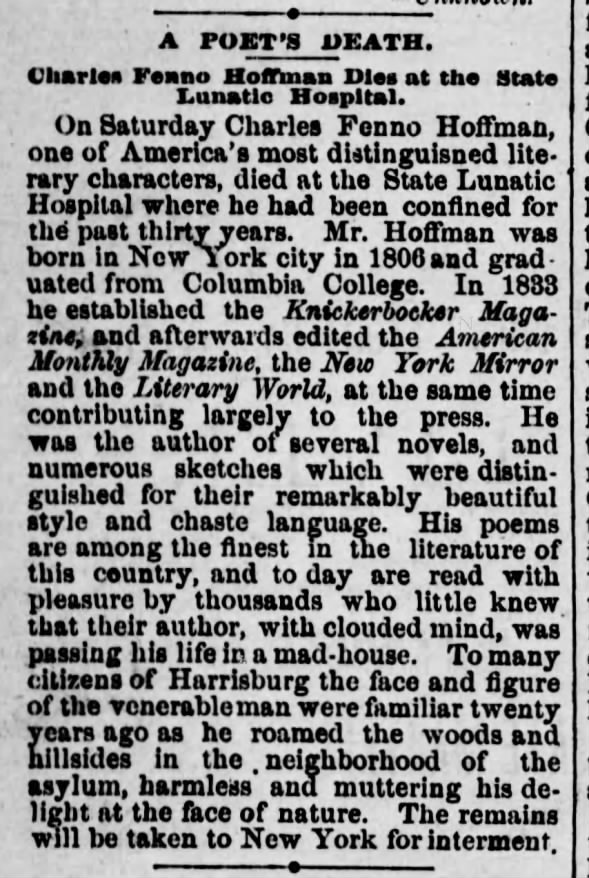 · Mon, Jun 9, 1884 – Page 4 · Harrisburg Telegraph (Harrisburg, Pennsylvania) · Newspapers.com
· Mon, Jun 9, 1884 – Page 4 · Harrisburg Telegraph (Harrisburg, Pennsylvania) · Newspapers.com
Related post:
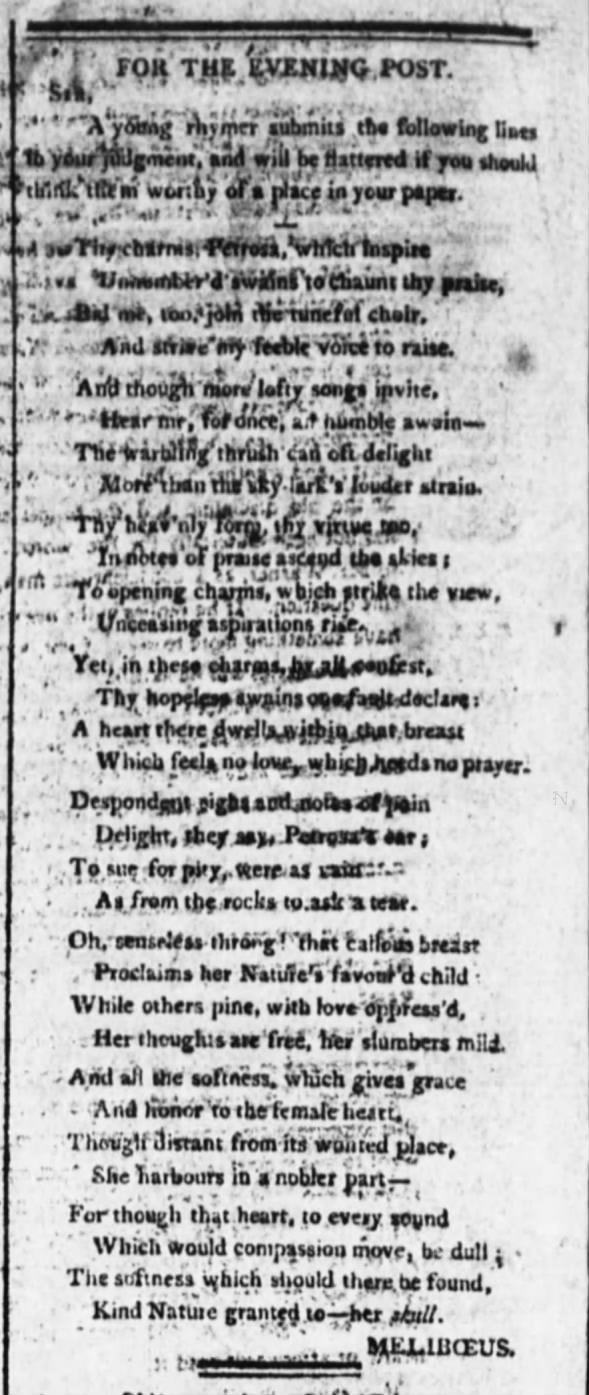 · Wed, May 9, 1804 – Page 2 · The Evening Post (New York, New York) · Newspapers.com
· Wed, May 9, 1804 – Page 2 · The Evening Post (New York, New York) · Newspapers.com















